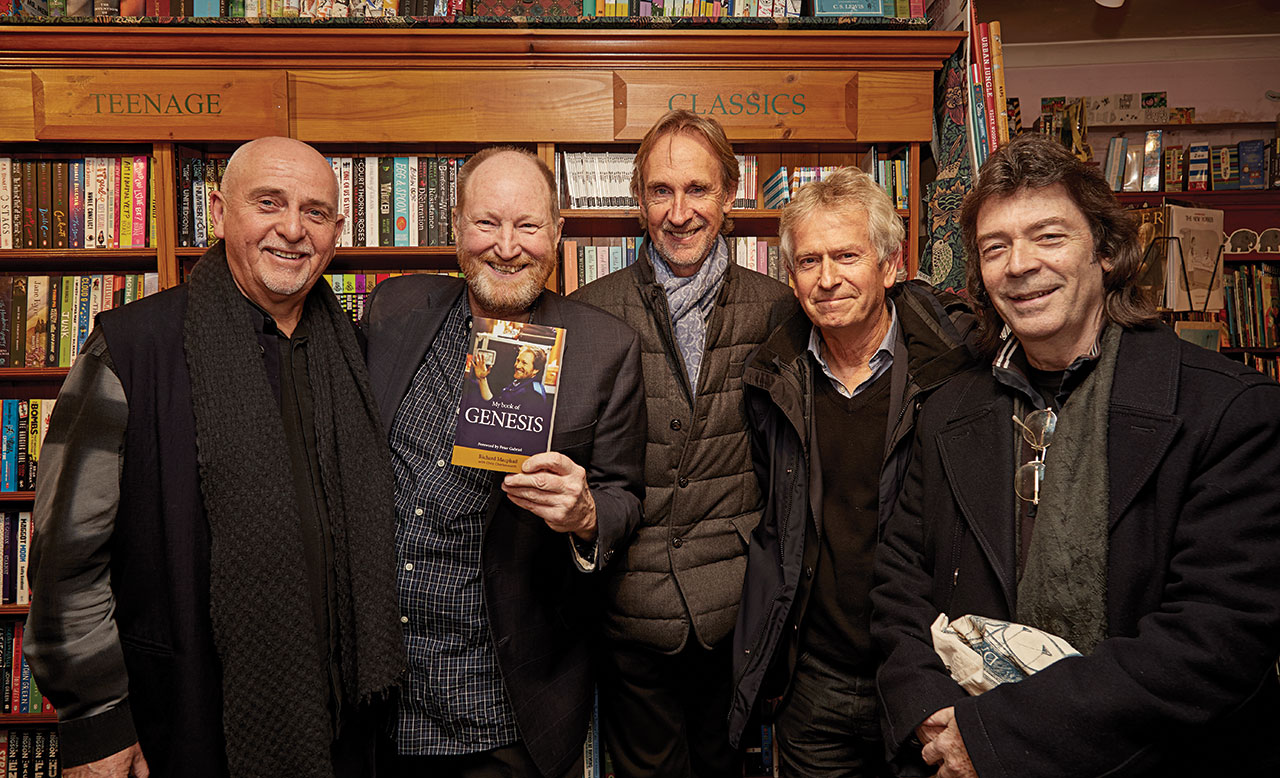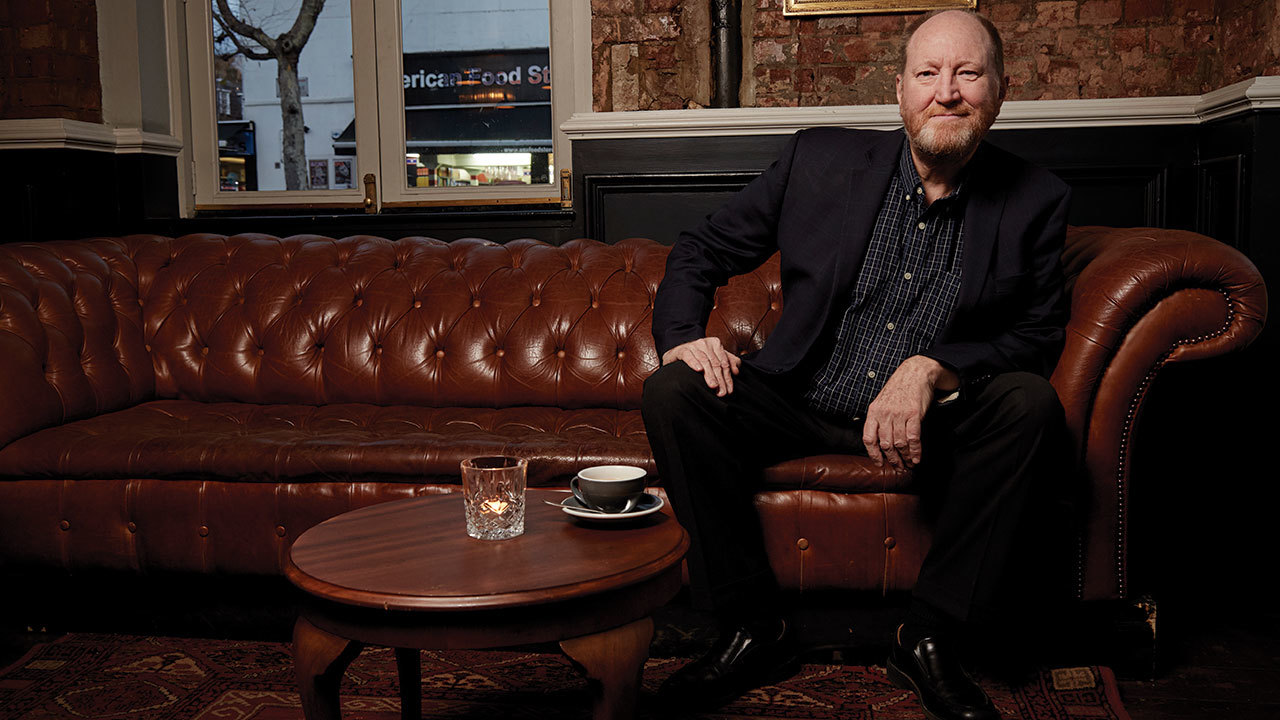Most Genesis fans know Richard Macphail from the photos that appear inside 1972’s Foxtrot album and on the back sleeve of 1973’s Genesis Live. The latter, bearing the inscription ‘Dedicated to Richard Macphail, who left in 1973,’ has provided the man with one or two amusing moments in a colourful life.
“To this day I still run into fans who firmly believe that this was a discreet reference to my untimely death,” he chuckles.
For those who don’t know, Macphail was a contemporary of Messrs. Banks, Gabriel, Phillips, Rutherford and Stewart at Charterhouse school. He sang in Anon, which featured Anthony Phillips, and later Mike Rutherford. Those two eventually hooked up with Peter Gabriel, Tony Banks and Chris Stewart of the Garden Wall to form Genesis. Macphail may have quit Anon, but he did not quit on his
school mates, and after returning from a kibbutz, he instigated, thanks to his parents, the use of Christmas Cottage near Wotton in Surrey, rent free for Genesis as they developed their sound above and beyond that of their From Genesis To Revelation album.
From here, Macphail is largely ingrained in Genesis lore. He became the band’s tour manager, later doing the same for Peter Gabriel (who’s penned the book’s foreword), before heading off for a career in ecological and environmental fields. And yet the ties are still strong: he was at the 2015 Progressive Music Awards when Peter Gabriel handed his Prog God crown on to Tony Banks.
Prog met him the day of the launch of his new book, simply titled My Book Of Genesis, before we strolled down to Daunt bookshop in Holland Park for a launch party, which was also attended by Tony Banks, Peter Gabriel, Steve Hackett and Mike Rutherford.
Your first book. A daunting task?
“At first, but I rather quite enjoyed the process. But then it was largely me recording my thoughts into an iPhone, taking it down to Chris Charlesworth [the former Melody Maker journalist turned book publisher] and he would get down to the business of crafting it into something readable. It took some time, partly because the pair of us could go off on tangents. If I mentioned something that he remembered he worked on back in his days as a music writer, off we’d go, chatting about it. We had a great conversation about The Who, for example. But after about two years, we had something approaching a workable manuscript.”

Has there been any reaction from the Genesis camp, either when you told them you were going to write the book, or now that it’s out?
“Well, Peter’s written the foreword and they’re all coming down to the party later, so I don’t think there’s any real problem. We’re all still on very good terms. They’re my friends.”
Mike and Phil have both written books and Armando Gallo’s books are essential. But aside from Daryl Easlea’s book on Peter, and Chapter And Verse, there’s a not a huge amount of books on the band. It’s strange when you consider the millions of albums they’ve sold…
“Well, there’s mine now! [Laughs] Yes, it is a bit strange, but the ones that are out there are mostly excellent. And they did sell a huge amount of records.”
Both Mike and Phil have been honest about the odd latter-day rock’n’roll indiscretion in their own books, but generally the Genesis story isn’t one of excess. There’s a much more familial feel which really comes across in your book.
“I know what you mean. Peter never took drugs, or Tony for that matter. Everyone liked a drink every now and then. I mean, I used to enjoy a bit of spliff, as I mention in the book, but then I was just an old hippie, really. But yes, there was always a sense of family about the band, especially in the early days when Ant [Phillips] was there. That still exists to this day. They all have their unique personalities, but there’s still a bond between them all.”
Christmas Cottage looms large in the book, and is integral to your continued connection with the band.
“Well, yes. I suppose you have my parents to thank for that. They let us use the cottage rent free in 1969 for about six months or so. It was good for the guys because I think it allowed them to find their natural sound. The debut album had come out but it wasn’t really representative of how they sounded live. It was that time of musicians going to the country to ‘get themselves together’. And most of Trespass was written at the cottage. They’d be playing gigs and just writing and recording. Peter and I would telephone a lot of record companies and it was during that time that [Genesis manager] Tony Stratton-Smith signed them to Charisma for £10. But it was at the cottage that Genesis really defined their sound.”
There’s a delightful sense of naïveté to many of the proceedings. Very much learning things as you went along, not just for you and your role with the band, but with the band and management too.
“That’s because that’s exactly what it was like. A lot of this stuff hadn’t been done before, so everyone was kind of learning as they went along.”
London copper Sergeant Long, who you had one or two run-ins with in the 70s, not least when he tried to arrest you for having an offensive weapon [a pick axe handle in the back of a van], sounds like a fun guy.
“Yes, very funny. Not least when Strat phoned up the police station and told them they had to let me go as I was the son of an admiral. It was Mike’s dad who was the navy man, but it worked. And when it went to court it got thrown out because, as I say in the book, a pick axe handle is not, per se, an offensive weapon. But that was very indicative of the times and people not being able to deal with
the shifting culture.”
My Book Of Genesis is out now via Argyll and Bute. See www.mybookofgenesis.com for more information.

